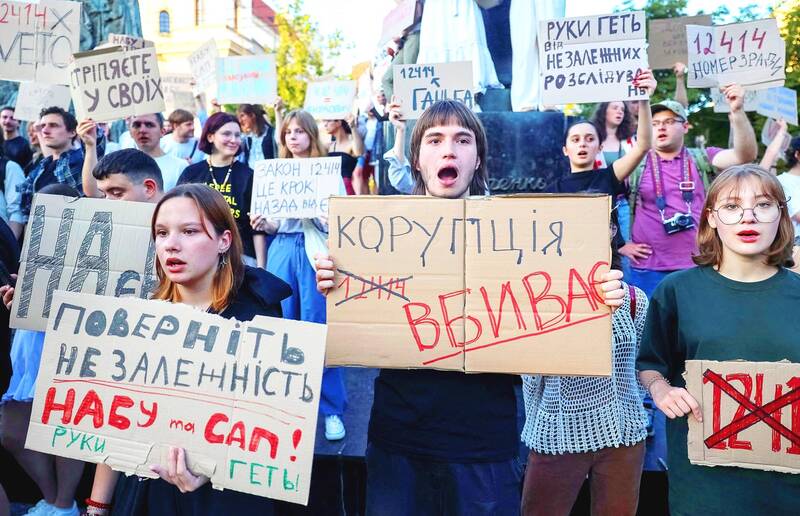Thousands of people on Tuesday gathered in Kyiv and other cities across Ukraine to urge Ukrainian President Volodymyr Zelenskiy to veto a bill that threatens infrastructure to counter corruption.
It marked the first major rally against the government in more than three years of war.
Ukraine ’s parliament passed legislation that would tighten oversight of two key anti-corruption agencies, which critics say could significantly weaken their independence and give Zelenskiy’s circle greater sway over investigations.

Photo: Reuters
Zelenskiy signed the bill into law, according to the parliament’s Web site late on Tuesday.
Fighting entrenched corruption is crucial for Ukraine’s bid to join the EU and maintain access to billions of dollars in Western aid. The legislation’s passage has triggered public outrage in Ukraine, with some saying it appeared to be a greater moral blow than the routine Russian drone and missile attacks.
The changes would grant the prosecutor general new authority over investigations and cases handled by the National Anti-
Corruption Bureau of Ukraine (NABU) and the Specialized Anti-Corruption Prosecutor’s Office (SAPO).
“In effect, if this bill becomes law, the head of SAPO will become a nominal figure, while NABU will lose its independence and turn into a subdivision of the prosecutor general’s office,” the agencies said in a joint statement on Telegram.
In a post on X, European Commissioner for Enlargement Marta Kos expressed concern over the vote in the parliament, called the Rada, calling it “a serious step back.”
“Independent bodies like NABU & SAPO are essential for Ukraine’s EU path,” Kos said. “Rule of Law remains in the very center of EU accession negotiations.”
While rallies have taken place during the war in Ukraine, they have largely focused on the return of prisoners of war or missing people.
“Corruption is a problem in any country and it must always be fought,” said Ihor Lachenkov, a blogger who urged people to join the protest through his social media platforms, which reach more than 1.5 million followers.
“Ukraine has far fewer resources than Russia in this war,” he said. “If we misuse them, or worse, allow them to end up in the pockets of thieves, our chances of victory diminish. All our resources must go toward the fight.”
The Ukrainian branch of Transparency International criticized parliament’s decision, saying it undermines one of the most significant reforms since what Ukraine calls its Revolution of Dignity in 2014 and damages trust with international partners.
The group urged Zelenskiy to veto the law, warning that otherwise he would share responsibility with the Rada for “dismantling Ukraine’s anti-corruption infrastructure.”
Many protesters carried signs reading: “Veto the law,” “Protect the anti-corruption system, protect Ukraine’s future,” or simply “We are against it.”
The mood of anger and frustration among the war-weary Ukrainians prevailed in the crowd. Some protesters accused Ukraine’s leadership of prioritizing loyalty and personal connections over the fight against corruption.
“Those who swore to protect the laws and the constitution have instead chosen to shield their inner circle, even at the expense of Ukrainian democracy,” said veteran Oleh Symoroz, sitting in a wheelchair because both his legs were amputated after he was wounded in 2022.
“Instead of setting an example of zero tolerance for corruption, the president is using his power to take control of criminal cases involving his allies,” he said.

VAGUE: The criteria of the amnesty remain unclear, but it would cover political violence from 1999 to today, and those convicted of murder or drug trafficking would not qualify Venezuelan Acting President Delcy Rodriguez on Friday announced an amnesty bill that could lead to the release of hundreds of prisoners, including opposition leaders, journalists and human rights activists detained for political reasons. The measure had long been sought by the US-backed opposition. It is the latest concession Rodriguez has made since taking the reins of the country on Jan. 3 after the brazen seizure of then-Venezuelan president Nicolas Maduro. Rodriguez told a gathering of justices, magistrates, ministers, military brass and other government leaders that the ruling party-controlled Venezuelan National Assembly would take up the bill with urgency. Rodriguez also announced the shutdown

Civil society leaders and members of a left-wing coalition yesterday filed impeachment complaints against Philippine Vice President Sara Duterte, restarting a process sidelined by the Supreme Court last year. Both cases accuse Duterte of misusing public funds during her term as education secretary, while one revives allegations that she threatened to assassinate former ally Philippine President Ferdinand Marcos Jr. The filings come on the same day that a committee in the House of Representatives was to begin hearings into impeachment complaints against Marcos, accused of corruption tied to a spiraling scandal over bogus flood control projects. Under the constitution, an impeachment by the

Exiled Tibetans began a unique global election yesterday for a government representing a homeland many have never seen, as part of a democratic exercise voters say carries great weight. From red-robed Buddhist monks in the snowy Himalayas, to political exiles in megacities across South Asia, to refugees in Australia, Europe and North America, voting takes place in 27 countries — but not China. “Elections ... show that the struggle for Tibet’s freedom and independence continues from generation to generation,” said candidate Gyaltsen Chokye, 33, who is based in the Indian hill-town of Dharamsala, headquarters of the government-in-exile, the Central Tibetan Administration (CTA). It

China executed 11 people linked to Myanmar criminal gangs, including “key members” of telecom scam operations, state media reported yesterday, as Beijing toughens its response to the sprawling, transnational industry. Fraud compounds where scammers lure Internet users into fake romantic relationships and cryptocurrency investments have flourished across Southeast Asia, including in Myanmar. Initially largely targeting Chinese speakers, the criminal groups behind the compounds have expanded operations into multiple languages to steal from victims around the world. Those conducting the scams are sometimes willing con artists, and other times trafficked foreign nationals forced to work. In the past few years, Beijing has stepped up cooperation